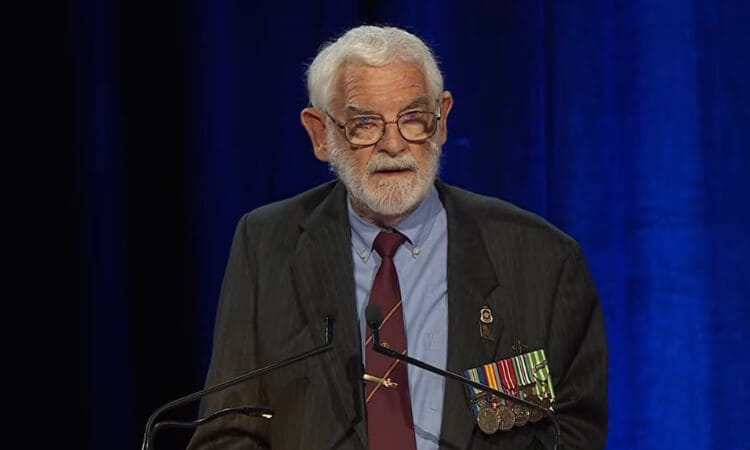Experimental film shot with 100-year-old camera earns multiple international awards

We often hear the term "they just don't make them like they used to" about film.
Rather than complain, University of Southern Queensland lecturer and filmmaker Dr Daryl Sparkes took matters into his own hands.
Eager to experience what Hollywood legends like Charlie Chaplin and Rudolph Valentino went through, Dr Sparkes bought a 100-year-old hand-cranked Cine-Kodak Model A 16mm movie camera in an auction house in New York earlier this year.
What transpired was a 10-minute experimental film called The Troxler Effect, for which Dr Sparkes, to his surprise, has earned multiple international accolades and been screened at film festivals worldwide.
"Millions of films have been made on 16mm film and still are," Dr Sparkes said.
"Famous filmmakers of the past, like Jean-Luc Godard and modern filmmakers like Wes Anderson, all used 16mm to create some of the greatest movies known. Natalie Portman's Black Swan, Cate Blanchett's Carol and Anderson's Moonrise Kingdom were all made on 16mm."
The film celebrates two major milestones – the first computer created by Charles Babbage in 1823 and the first 16mm film camera invented by the Kodak company in 1923, which ushered in a new era of filmmaking.
In making the film, Dr Sparkes used the same techniques of filmmaking used a century ago, including hand-drawn titles and credits.
He even created the music on a 1920s Wurlitzer cinema organ – the same one that used to be in the Regent Cinema in Brisbane's Queen Street Mall but is now stored in the Queensland Gallery of Modern Art.
Dr Sparkes filmed the final scene on a smartphone and used AI technology on a computer to distort the faces of the actors.
"I wanted there to be a link between the first computer in 1823, the invention of 16mm film in 1923 and the advent of artificial intelligence in 2023; the 200 years in technological evolution all coming together this year," he said.
The film took six months to make and features Dr Sparkes' wife, Deborah Marshall, as the lead actress.
It has so far achieved 30 international awards and accolades, including being selected at the British International Film Festival, the Wales International Film Festival, the Buenos Aires International and the 35th Girona Film Festival in Spain and claiming Best Experimental Film at the Los Angeles Cinematography Awards and Best Director at the Stockholm Short Film Festival.
Dr Sparkes said he created the film to provoke discussion about the crucial developments in filmmaking and technology, both past, present, and future.
"Discovered in the 19th century, the Troxler effect argued that distortions in light and focus affected the brain's visual cortex, which could lead to horrific or mutated images appearing when a person looked at a reflection of their own image in a mirror for too long," he said.
"As artificial intelligence becomes more widespread in filmmaking, I wanted to illustrate that filmmaking technology originated with actual people as actors but has evolved over the past hundred years into digitised code that computers can distort and rearrange.
"The recent actors strike in the United States happened because actors feared artificial intelligence could take their place.
"It's coming to a stage where it is possible that you could be watching a film with actors like Tom Cruise or Nicole Kidman, and they are just computer simulations.
"You could even see actors who have passed away like Humphrey Bogart or Marilyn Monroe appearing in films, and it will look and sound just like them."
Following its dream run on the international film festival circuit, Dr Sparkes' next goal is to have the film screened in Australia next year.
"I'm looking forward to being able to travel to different cities to screen the film and talk about it to Australian audiences," he said.


